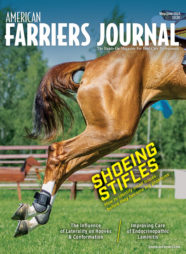When Richard Duggan moved from Minneapolis to the Elk River area, his neighbor told him that now he was in the country he should have a horse.
“So he bought a horse and stabled it at his farm,” says his wife, Nancy. “From that it grew into a passion for horses.”
In 1969, Richard enrolled in the horseshoeing program at Anoka Technical College and eventually began teaching there. When that program was reduced in 1976, he started his own school.
Today, the Duggans and two of their children operate the Minnesota School of Horseshoeing and Duggan Farrier Supplies in Ramsey.
Nancy will represent the school at District 728 Community Education’s Career Exploration Fair on Feb. 28 at the Handke Center in Elk River.
Ironically, she discovered along way that she’s allergic to horses. So she’s not a farrier herself, but works in other aspects of the business.
Nancy says it takes three things to be a successful farrier: horsemanship skills, people skills and forging skills.
“Some people just don’t have it,” she says. “They might have the love of the horse, but might not have the other skills.”
For those that have what it takes, it can be a very good career. The average farrier in the Midwest earns about $82,000 a year, she says, and some make six figures.
She’s known people who have paid their way through veterinarian school by shoeing horses. Others have paid for their farms.
“It’s work, but it’s a rewarding career because you’re working with a live animal,” she says. “It’s healthy for your body because you’re using all your muscles.”
The Minnesota School of Horseshoeing offers 10-week, 12-week and 24-week programs for professional farriers.
“There’s a lot to learn,” she says. “The anatomy (of the horse) is a critical thing in horseshoeing so they have to really learn that.”
For horse owners, the school offers a two-week trim class and a four-week horseshoeing class (two weeks of trimming and two weeks of horseshoeing).







Post a comment
Report Abusive Comment